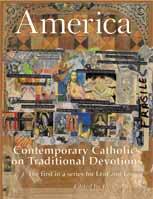Traditional devotions can provoke a wide variety of reactions among contemporary Catholics. For many, the devotional life discovered during childhood has never lost its appeal. For some it has always remained on the fringes of their Catholicism. For still others it seems inconsistent with a mature faithand even vaguely superstitious. At the same time, a number of studies suggest that younger Catholics may be more open than their immediate elders to traditional devotions.
This variety of responses raises some interesting questions: What do traditional devotions have to say to contemporary Catholics? How might a devotion that has seen its popularity wax and wane (and now wax again) speak to Catholics unfamiliar with its appeal? Can devotions that often carry heavy theological and cultural baggage find a place in the post-Vatican II church? In short, what might devotions mean today?
This series for Lent and Easter focuses on the world of devotions in the life of contemporary believers. America asked a number of writers, many of them younger Catholics, to speak about a favorite devotionits history, its place in the writer’s life and its possible role in the life of contemporary believers. In this third part of the series we look at two: the Miraculous Medal and the Liturgy of the Hours.








